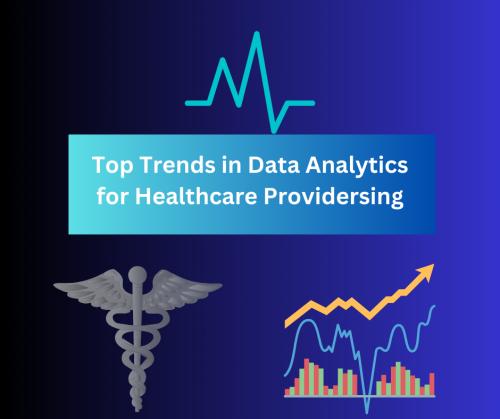Top Trends in Data Analytics for Healthcare Providers

In today's
fast-paced healthcare environment, data analytics is transforming how providers
deliver care, manage operations, and make strategic decisions. This article
explores the top trends in Healthcare
Data Analytics, highlighting how these advancements are enhancing
patient care, improving operational efficiency, and driving data-driven
decision-making.
The Importance of Data Analytics in Healthcare
Enhancing Patient Care
Personalized Medicine
Imagine
going to the doctor and receiving a treatment plan tailored specifically to
your genetic makeup. Personalized medicine, powered by data analytics, is
making this a reality. By analyzing patient data, including genetic
information, healthcare providers can develop customized treatment plans that
are more effective and have fewer side effects.
Predictive Analytics for Early Diagnosis
Predictive
analytics is
another game-changer in patient care. By examining patterns in patient data,
predictive models can identify individuals at risk of developing certain
conditions long before symptoms appear. This early diagnosis allows for prompt
intervention, potentially saving lives and reducing the burden on healthcare
systems.
Operational Efficiency
Streamlining Hospital Operations
Data
analytics isn't just for patient care; it's also revolutionizing hospital
operations. By analyzing data on patient flow, staffing levels, and resource
utilization, hospitals can optimize their operations to reduce wait times,
prevent bottlenecks, and improve the overall patient experience.
Reducing Healthcare Costs
Healthcare
costs are a major concern for providers and patients alike. Through data
analytics, healthcare organizations can identify inefficiencies and areas of
waste, leading to significant cost savings. For example, predictive maintenance
on medical equipment can prevent costly breakdowns and reduce downtime.
Data-Driven Decision Making
Evidence-Based Practice
Evidence-based
practice is the gold standard in healthcare, and data analytics is at its core.
By leveraging vast amounts of clinical data, healthcare providers can determine
the most effective treatments and interventions based on real-world evidence,
rather than relying solely on clinical trials or expert opinion.
Strategic Planning and Policy Making
Healthcare
organizations are also using data analytics for strategic planning and policy
making. By analyzing trends and outcomes, providers can make informed decisions
about resource allocation, service expansion, and policy changes, ensuring that
they are meeting the needs of their patient populations.
Top Trends in Data Analytics for Healthcare Providers
AI and Machine Learning
Predictive Modeling
AI and
machine learning are driving predictive modeling to new heights. These
technologies can analyze vast datasets to predict patient outcomes, disease outbreaks,
and even the effectiveness of new treatments. This level of insight was
unimaginable just a few years ago.
Natural Language Processing
Natural
language processing (NLP) is another exciting trend. NLP enables computers to
understand and interpret human language, making it possible to analyze
unstructured data like doctor's notes and patient records. This can uncover
insights that were previously hidden in plain text.
Big Data Analytics
Managing Large Data Sets
Big data
analytics is essential for handling the massive amounts of data generated by
healthcare systems. Advanced analytics tools can process and analyze these
large datasets to extract valuable insights, helping providers make data-driven
decisions.
Real-Time Analytics
Real-time
analytics allows healthcare providers to make immediate decisions based on
current data. This is particularly useful in emergency situations where time is
critical. Real-time data can also help in monitoring patient vitals and responding
to changes instantly.
Cloud Computing in Healthcare Analytics
Scalability and Flexibility
Cloud
computing offers scalability and flexibility, which are crucial for modern
healthcare analytics. Providers can store and analyze large datasets without the
need for expensive on-site infrastructure. This makes it easier to scale
operations as needed.
Data Security and Compliance
With the
increase in data breaches, data security is a top priority. Cloud providers are
investing heavily in security measures to protect sensitive healthcare data.
Compliance with regulations such as HIPAA is also ensured, making cloud
computing a viable option for healthcare analytics.
The Role of IoT in Healthcare Analytics
Wearable Technology
Wearable
technology, such as fitness trackers and smartwatches, is becoming increasingly
popular. These devices collect real-time health data that can be analyzed to
monitor patient health, detect anomalies, and provide insights into lifestyle
changes that can improve health outcomes.
Remote Patient Monitoring
Remote
patient monitoring (RPM) uses IoT devices to track patient health from a
distance. This is especially beneficial for chronic disease management,
allowing healthcare providers to monitor patients continuously and intervene
when necessary, without the need for frequent in-person visits.
Blockchain for Data Security
Ensuring Data Integrity
Blockchain
technology offers a secure way to manage healthcare data. By providing a
decentralized and immutable ledger, blockchain ensures that data cannot be
altered or tampered with, maintaining its integrity and trustworthiness.
Enhancing Patient Privacy
Blockchain
also enhances patient privacy by allowing individuals to control who has access
to their data. This level of control is critical in an era where data breaches
and privacy concerns are increasingly common.
Challenges in Implementing Data Analytics
Data Privacy Concerns
Despite its
benefits, data analytics poses significant privacy concerns. Ensuring that
patient data is protected and used ethically is a major challenge for
healthcare providers. Compliance with privacy regulations is essential to
maintain patient trust.
Integration with Existing Systems
Integrating
new data analytics tools with existing healthcare systems can be complex and
costly. Providers must ensure that these tools are compatible with their
current infrastructure to avoid disruptions in service.
Skilled Workforce Shortage
There is a
shortage of skilled professionals who can manage and analyze healthcare data.
Investing in training and education is crucial to developing a workforce
capable of leveraging data analytics to its full potential.
Conclusion
Data
analytics is revolutionizing healthcare, offering unprecedented opportunities
to enhance patient care, improve operational efficiency, and make data-driven
decisions. While challenges remain, the benefits far outweigh the obstacles. As
technology continues to advance, the role of data analytics in healthcare will
only grow, driving innovation and improving health outcomes for patients
worldwide.
If you're
thinking about diving into the world of Healthcare Data Analytics, taking a data analytics
course online can help you navigate the opportunities!
Comments